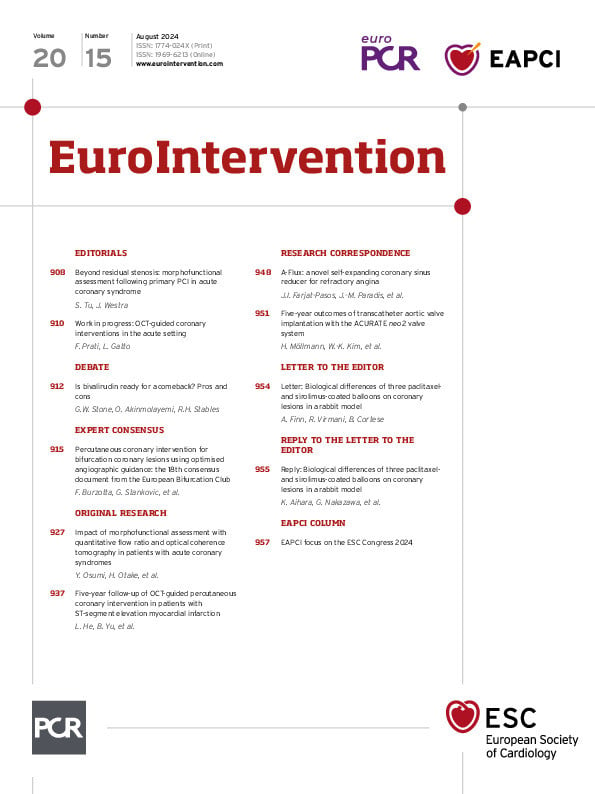At the end of this month, the wider cardiology community will come together both online and in-person in London to meet, network and learn about the newest advances and evidence in cardiology at the European Society of Cardiology Congress. The theme of the 2024 congress is Personalising Cardiovascular Care; it focuses on empowering patients though treatment tailored to their needs with the overall goal of improving outcomes, reducing risk and redefining the standard of care. As always, the ESC Congress programme is developed in collaboration with the seven ESC associations. EAPCI members are represented by the EAPCI Scientific Programme and Congress Committee, chaired by Gabor Toth and Nicole Karam. Once again, the committee has developed numerous exciting sessions in conjunction with EAPCI members. EAPCI members will play an active role throughout the congress presenting hotline clinical trials, clinical cases and abstracts as well as participating in the sessions.
Four new ESC guidelines will be presented throughout the congress, with the 2024 ESC Guidelines on Chronic Coronary Syndromes being particularly relevant to EAPCI members. The guidelines task force, chaired by Felicita Andreotti and Christiaan Vrints, will present the guidelines on the 31 August at 13:45 in Room London. Later that afternoon, there will be the now traditional opportunity to interact with the authors in the Ask the Guidelines Task Force session in Room Brussels at 16:15 and finally, the Guidelines in Practice session in Room Warsaw at 17:30.
This year the ESC Andreas Grüntzig Lecture in Interventional Cardiology will be delivered by Holger Thiele (Heart Center Leipzig at University of Leipzig) on the topic of “Cardiogenic shock complicating acute myocardial infarction – current evidence and future strategies”. Julinda Mehilli will present the award on 1 September at 11:00 in Room Helsinki.
In this year’s Hot Line sessions, there are numerous trials of interest to the interventional community in both the coronary and structural fields. Structural intervention is the focus of the Hot Line sessions on the 31 August. RESHAPE-HF2, MATTERHORN and Tri.fr will be presented during Hot Line session 3 at 11:00. Hot Line session 5 at 17:35 will focus on TAVI, with NOTION-3 (PCI in patients undergoing TAVI), POPular PAUSE TAVI (continuing or interrupting oral anticoagulation during TAVI), and RHEIA comparing TAVI with SAVR in women with severe AS.
Older patients are the focus of Hot Line session 8 on 1 September at 16:15, with SENIOR RITA randomising older patients with NSTEMI to invasive or conservative management and EARTH-STEMI evaluating complete versus culprit-only revascularisation in older STEMI patients. The session concludes with SCOFF, comparing fasting or not fasting prior to cardiac catheterisation. During Hot Line session 11 on 2 September at 13:45, the OCCUPI, INFINITY-SWEDEHEART and REC-CAGEFREE I trials will be presented, focusing on OCT-guided PCI, bioadaptors versus contemporary DES, and DCB versus DES, respectively.
There are a number of Great Debate sessions which will likely appeal to EAPCI members as well, including the topic of “TAVI in non-surgical centres” in Room Brussels on 2 September at 15:15, chaired by Helge Möllmann and EAPCI President-Elect Martine Gilard. “Cardiogenic shock and the role of mechanical circulatory support” is the topic of two Great Debate sessions: one session in Room Brussels on the 30 August at 8:15, focusing on the management of cardiac arrest and cardiogenic shock, chaired by Mirvat Alasnag and Alain Combes; and the second on 31 August at 11:00 in Room Brussels, chaired by Martine Gilard and Roxana Mehran. During this latter session, Navin Kapur (pro) and Holger Thiele (con) will debate “Mechanical circulatory support is of benefit in cardiogenic shock”.
This year there are a number of practical seminars covering a broad spectrum of topics in interventional cardiology including “How to diagnose and manage uncommon causes of myocardial infarction” (30 August – 11:00 – Room Warsaw), “Intracoronary imaging and physiology in 2024" (1 September – 17:30 – Room Prague), and “Personalising antithrombotic strategies in acute and chronic coronary syndromes” (2 September – 15:15 – Room Belgrade). Finally, Room Prague offers “A year in review: top trials in coronary interventions” (1 September – 11:00) and “A year in review: top trials in structural interventions” (2 September – 15:15).
The 2024 edition of the ESC Congress will undoubtedly be a highly educational event, giving our community an opportunity to engage in the latest science, and to share and learn from each other.

